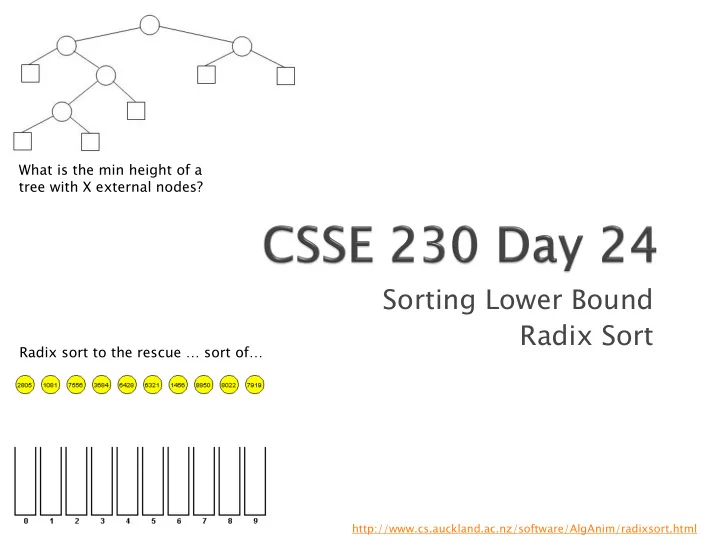

What is the min height of a tree with X external nodes? Sorting Lower Bound Radix Sort Radix sort to the rescue … sort of… http://www.cs.auckland.ac.nz/software/AlgAnim/radixsort.html
EditorTree evals due last night – late is better than never on these, though! Questions on WA8? Demo of Doublets ◦ Ask questions
We can’t do much better than what we already know how to do.
Lower bound for best case? A particular algorithm that achieves this?
Want a function f( f(N) N) such that the wors worst t case ru runnin ing tim time for all ll sort ortin ing alg lgor orit ithms ms is Ω (f( f(N) N)) How do we get a handle on “all sorting algorithms”? Tricky!
We can’t list all sorting algorithms and analyze all of them ◦ Why not? But we can find a unif iform orm representa esentation of any sorting algorithm that is based on com ompa parin ing elements of the array to each other
The problem of sorting N elements is at least as hard as determining their ordering ◦ e.g., determining that a 3 < a 4 < a 1 < a 5 < a 2 ◦ sorting = determining order, then movement So any lower bound on all "order- determination" algorithms is also a lower bound on "all sorting algorithms"
Q1 Let A be any co comp mparison-based a alg lgorith ithm for sorting an array of distinct elements Note: sorting is asymptotically equivalent to determining the correct order of the originals We can draw an EBT that corresponds to the comparisons that will be used by A to sort an array of N elements ◦ This is called a sor sort d t deci ecisi sion tr tree ee ◦ Just a pen-and-paper concept, not actually a data structure ◦ Different algorithms will have different trees
Q2-4 Minimum number of external nodes in a sort decision tree? (As a function of N) Is this number dependent on the algorithm? What’s the height of the shortest EBT with that many external nodes? No comparison-based sorting algorithm, known or not yet discovered, can ever er do better than this!
Ω (N log N) is the best we can do if we compare items Can we sort without comparing items?
Q5 O(N) sort: Bucket sort ◦ Works if possible values come from limited range ◦ Example: Exam grades histogram A variation: Radix sort
Q6-7 A picture is worth 10 3 words, but an animation is worth 2 10 pictures, so we will look at one. http://www.cs.auckland.ac.nz/software/AlgA nim/radixsort.html
Q8-10 10 It is O(kn) ◦ Looking back at the radix sort algorithm, what is k? Look at some extreme cases: ◦ If all integers in range 0-100 (so many duplicates if N is large),m then k = _____ ◦ If all N integers are distinct, k = ____
Used an appropriate combo of mechanical, digital, and human effort to get the job done. http://en.wikipedia.org/wiki/IBM_card_sorter
Recommend
More recommend